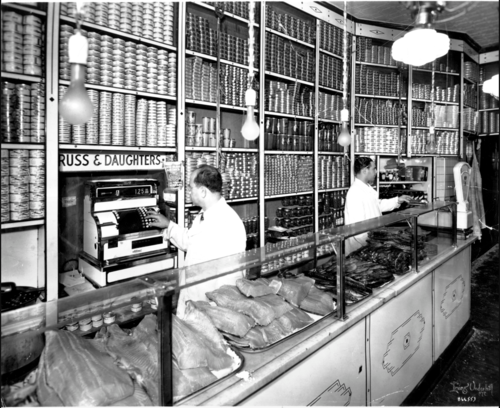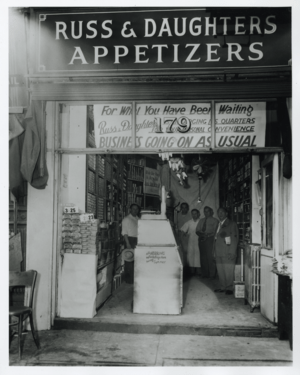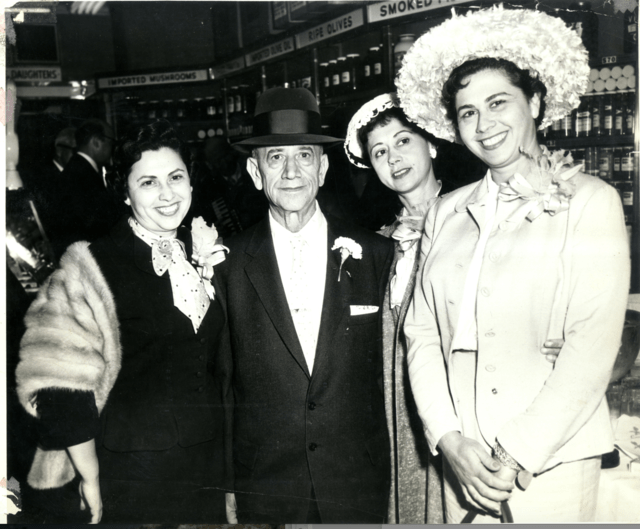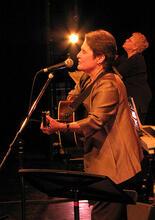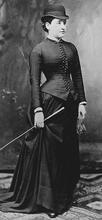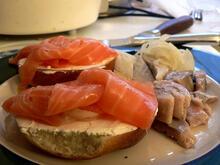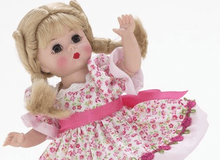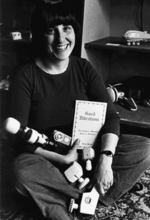Niki Russ Federman
Niki Russ Federman is the fourth-generation co-owner of Russ & Daughters, the iconic appetizing shop founded in 1914 on the Lower East Side of Manhattan by her great-grandfather, Joel Russ. Known globally for its bagels, lox, babkas, and other Ashkenazi Jewish food delicacies, Russ & Daughters is venerated by devoted fans from Martha Stewart to Ruth Bader Ginsburg. The shop got its distinctive moniker when Joel Russ decided to include his daughters Anne Russ Federman (1921-2018), Hattie Gold (1913-2014), and Ida Schwartz (1915-2001) in the business’s name in the 1930s. By maintaining its reputation for culinary excellence for over a century in business, Russ & Daughters continues to be beloved by fans of Jewish food and feminists alike and has now expanded into four locations in New York City, including the original store on Houston Street.
Niki Russ Federman (b. November 15, 1977, Brooklyn, New York) is the fourth-generation co-owner of Russ & Daughters, the iconic appetizing shop founded in 1914 on the Lower East Side of Manhattan by her great-grandfather, Joel Russ. Named by Mr. Russ to include his daughters Hattie Gold (1913-2014), Ida Schwartz (1915-2001), and Anne Russ Federman (1921-2018), the shop is believed to have been the first business in the United States that included daughters in the name when it was incorporated in 1935. By maintaining its reputation for culinary excellence for over a century in business, Russ & Daughters continues to be beloved by fans of Ashkenazi food and feminists alike, while serving as a sensory link to foods eaten by Eastern European Jewish immigrants to America during the migration of the early twentieth century.
Bagels, Lox, & Schmear
On a gray afternoon in November 2019, Niki Russ Federman smiled brightly as she led a visiting journalist into the Russ & Daughters store on Houston Street. As narrow and gleaming as a perfectly cut slice of lox (which ideally is supposed to be thin enough to read The New York Times through), the shop’s snug dimensions feature chrome-framed glass counters displaying a treasure trove of herring, sable, and salmon waiting to be sliced by hand by white-coated counter people.
“You have to take a number!” a waiting customer instructed Russ Federman as she entered her store. Not realizing that the person she was speaking to was the fourth-generation co-owner, the customer pointed emphatically to a ticket dispenser that stood on the counter. “Thanks,” Russ Federman replied with a modest graciousness and warm smile. “It’s a learning process for everyone.”
Taking a number is part of the ritual of a pilgrimage to the Lower East Side store, which is as much of a Jewish experience for some as any religious service. “The customers learn how to wait and then the counter people give them their full attention,” Russ Federman explained. She gestured towards the line out the door, filled with eager customers—including global tourists, Jews buying a nosh, and local foodies—all waiting their turn for the bagels and lox of their dreams. It’s not unusual for the line to be up to two hours on weekends.
Remembering her childhood visits to the store in the Russ & Daughters documentary film The Sturgeon Queens, U.S. Supreme Court Justice Ruth Bader Ginsburg recalled her delight in going to the shop on Houston Street as a girl with her mother. “Even before I heard the word feminist, it made me happy to see that this was an enterprise where the daughters counted just like sons,” recalled Justine Ginsburg. She also noted that she enjoys Scottish Nova on her Russ & Daughters bagel and schmear, describing it with a wide smile as “delicious.”
An Appetizing History
When Russ & Daughters began in 1914, Joel Russ was a newly arrived Jewish Eastern European immigrant who had fled Galicia, Poland, to join his sister in New York and begun selling schmaltz herring from a barrel to support his family. By 1935 he had established his shop and distinguished it from the competition on the Lower East Side by including his three daughters—Ida, Hattie, and Anne—in the name and ownership of his business. All the daughters had worked at the store since their early teens, and their contributions became a recognized and distinguishing feature of the family business.
Today, Russ & Daughters is one of the few remaining appetizing shops in New York City. While delicatessens, or “delis,” are more commonly known now, they began as the place where kosher customers got flayshich (meat) foods. Appetizing shops were the deli’s dairy equivalent. They provided kosher customers with milchech (dairy) or parve (neither milk nor meat) foods—like bagels, cream cheese, herring, and lox. As Jews assimilated, they moved out of the immigrant ghetto of the Lower East Side and kept less strictly kosher. The separate shops that specialized in dairy foods began to close, but Russ & Daughters stayed open, persevered, and thrived under the care of four generations of the Russ family.
It’s been over a decade since Russ Federman and her first cousin, Josh Russ Tupper, took over the family enterprise in 2009 from Niki’s father, Mark Russ Federman, the third-generation owner. In that time the cousins have opened two restaurants in Manhattan (including a cafe that regularly lands on the best-restaurant lists in New York City, and a kosher outpost at the Jewish Museum on 5th Avenue) and an emporium in Brooklyn’s Navy Yard, complete with an in-house bakery, in addition to a thriving mail-order business. They have retained the authenticity of food memories of the Jewish Lower East Side while evolving into a culinary destination whose reputation is intertwined with the best of New York City.
“What’s more New York than Russ & Daughters?” asks Peter Meehan, the food editor of the Los Angeles Times. “It truly is the apex of a certain kind of restaurant that was once more common in New York. Russ & Daughters is a conduit of a tradition. Niki is invested in what Russ & Daughters is and what it means to the Jewish community for sure, but also to New Yorkers who have adopted it as part of their lives. I love to see her in her white coat running things—and while I’m sure she could have chosen a different path for herself, I think any legacy she has been entrusted with is not something to uphold as much as something to keep vital and living, which I feel like she’s done an exceptional job of.”
“There’s a history of strong women in our family, and I think Niki is holding that torch,” said her cousin and co-owner, Josh Russ Tupper (who is also the grandson of Anne Russ Federman). “People gathered around our grandmother, Anne, as the matriarch. We come from a long line of powerful women of which Niki is one.”
Anne Russ Federman recalled later in life that she once had ambitions to own a dress shop, but she subsumed her own desires and joined the family business instead. She would complain that her social life as a teenager suffered because she always smelled of fish, although that didn’t prevent a customer from setting her up with her future husband, Herbert Federman, who was described to her by their matchmaker as the “sheik of Brooklyn.” After their marriage, Herbert joined Anne and her sisters behind the counter at Russ & Daughters, marking the second generation of family ownership.
Anne and Herbert’s son, Mark Russ Federman, left his career as a lawyer and took the shop over from his parents. With the help of his wife Maria (a scientist from Colombia, giving Niki Latina heritage and an ability to speak fluent Spanish), Mark ran the store for over 30 years, a time he chronicles in his memoir, Russ & Daughters: Reflections and Recipes From the House that Herring Built (Schocken Books).
Tradition in Transition
Joining her father at the store, Russ Federman grew up as a shop kid, sneaking treats from the candy counter and watching older men hang out chewing on bokser, a carob pod commonly enjoyed on Tu B’shvat (it now lives on at the Russ & Daughters Café as an ingredient in egg creams). The store and its customers were absorbed into Niki’s consciousness from childhood, especially watching her father kibbitz with his opening question for new customers: “What’s your story, boychik?” But, as always with Russ & Daughters, the food being of impeccable quality came first.
“We were stalwarts of keeping traditional bagels,” Russ Federman recalled, about when she and Josh began as co-owners. “As the old-school bagel bakers were disappearing it became harder to find the quality we insisted on. When we decided to become bakers, it was Josh and me with a two-by-four plank and a Kitchen Aid mixer above the store. The first dozen bagels we made were a triumph. Now we make 500,000 a year.”
It may now seem obvious that she was meant to carry on the tradition, but Russ Federman went through her own journey to claim her white coat behind the counter. Raised in Brooklyn, she attended St. Anne’s and went on to study political science at Amherst College. After graduating in 1999, Russ Federman moved to California and worked as an executive assistant to the Director of the San Francisco Museum of Modern Art. Her older brother, Noah Federman, didn’t join the family business either, attending medical school and becoming an oncologist in Los Angeles, causing their father Mark to quip that he was the only Jewish parent who was ever disappointed that his son became a doctor.
In her 20s Niki came back to New York and found herself living back above the shop on Houston Street, contemplating whether she wanted to join the family business full time or go into the arts. She began an MBA at Yale but quickly realized it wasn’t for her, dropping out before her first year was over.
“Honestly, business school was more of a legitimized way to buy time and space from Russ & Daughters to help me figure out my path on my own terms, ” Russ Federman recalled. “Working at SFMOMA gave me an understanding and comfort level with the inner workings of cultural institutions. I love art and culture and the people who make and preserve it. Through Russ & Daughters I get to feed two sides of myself. I get to be at the helm of a cultural touchstone and to be around creators of arts and culture.
Inevitably, no matter where she was, people would regale her with stories of their love for Russ & Daughters and their own family’s food traditions. It began to settle in her heart where she belonged. She joined forces with her cousin Josh, and they began their apprenticeship with Mark to learn the trade. Now her days include tasks as varied as showing a German film crew how the Brooklyn Navy Yard bakery makes challah, lecturing MBA students on legacy food businesses, managing the logistics behind the scenes, or utilizing her slicing skills at the counter while meeting new customers.
In 2020 as the COVID-19 epidemic brought the restaurant industry to its knees, Russ & Daughters worked with Jewish non-profits to bring meals to front-line workers at New York’s hospitals, and Russ Federman became an active force in the Independent Restaurant Coalition. Actor Jake Gyllenhaal, a devoted fan of Russ & Daughters, became a viral social-media sensation by posing in a tie-dyed t-shirt from the store to do a one-armed handstand. To raise funds for the Coalition, which lobbies for legislation to aid the food industry and its workers, Russ & Daughters offered copies of the T-shirt, tie-dyed in salmon pink, which quickly sold out. Russ Federman said working as an advocate during such a tumultuous time has been “a fulfilling silver lining.”
A Family Legacy
The Russ legacy was the subject of a 2019 exhibition, An Appetizing Story, at the American Jewish Historical Society, which has acquired the archives of Russ & Daughters. Annie Polland, executive director of AJHS, emphasizes the role of the daughters in the story.
“The expectations of and opportunities for Jewish women have changed immeasurably since the time Joel Russ arrived in New York, but the Russ & Daughters story shows how women have keen business acumen,” said Polland. “It’s as if Niki channeled her grandmother Anne, and her great aunts, but was able to strike out on her own, and then applied it back to the business. This was an opportunity the granddaughter had that the grandmother did not. Yet still, the store allowed that energy to be transmitted through the generations. I think Niki and Josh both have a legacy and a responsibility to ensure that Russ & Daughters continues its amazing work, and that the transmission of its history—one in which women were so central—lives on.”
Since taking the helm, Russ Federman has found a way to weave the strands of her passions for food and culture together. Russ & Daughters is regularly hailed by tastemakers like Martha Stewart, who sells her own curated basket of Russ & Daughter favorites. The cafe has been featured on the millennial cult favorite TV show “Broad City,” starring comedians Ilana Glazer and Abbi Jacobson, and hosts music nights with musicians such as Laurie Anderson, whose late husband Lou Reed was a loyal customer. Anderson also hosted the Café’s first A seven-day festival to commemorate the Exodus from Egypt (eight days outside Israel) beginning on the 15th day of the Hebrew month of Nissan. Also called the "Festival of Mazzot"; the "Festival of Spring"; Pesah.Passover seder, featuring musicians including Suzanne Vega and Basya Schechter from Pharaoh's Daughter.
Jenji Kohan, a regular customer and creator of “Orange is the New Black” and “Weeds,” thinks the lure of Russ & Daughters is only enhanced by its owner: “Niki is simply impressive. She’s taken the reins of this legacy business, grown it while keeping it haimish, and all with a smile on her face, small conversations that make everyone feel seen and heard, and a wicked way with a fish knife. She’s the coolest.”
“I don’t know if there will be a fifth generation that will want to continue on in the family business, but we make sure to care for it in the fourth so that if they do, it will be something they can be proud of.” said Russ Federman, who currently lives in Brooklyn with her husband and two young children. “We want Russ & Daughters to keep serving our customers a combination of food and love.”
Cohen, Julie, Director and Writer. The Sturgeon Queens, Documentary Film, 2014, 52 minutes. Available on Amazon Prime.
Ellenson, Ruth Andrew. “A Legacy of Lox.” Lillith Magazine, Fall-Winter 2019-2020.
Federman, Mark Russ. RUSS & DAUGHTERS: Reflections and Recipes From the House That Herring Built. New York: Schocken Books, 2013.
Garner, Dwight. “Noshing with the Fishes on the Lower East Side.” The New York Times, February 28, 2013.
Goldfield, Hannah, “Schmear Campaign.” The New Yorker, June 23, 2014.
Guerrero, Melissa. “Russ & Daughters History Goes on Display.” The New York Times, September 12, 2019.
Nadelson, Reggie. “The Family Run Store That’s Sold New York’s Best Lox Since 1914.” The Style Magazine, The New York Times, December 2018.
Roberts, Sam. “Anne Russ Federman, Scion of a Royal Family of Smoked Fish, Dies at 97.” The New York Times, September 21, 2018.
Saperstein, Pat,.“Jake Gyllenhaal Teams With Russ & Daughters to Benefit Struggling Restaurants.” Variety, August 18, 2020.
Sheraton, Mimi. “Ida Russ Schwartz, A Purveyor of Delicacies.” The New York Times, September 4, 2001.
Trillin, Calvin. “The Lower East Side: A Sunday Morning Tale.” The New Yorker, February 16, 1973.


